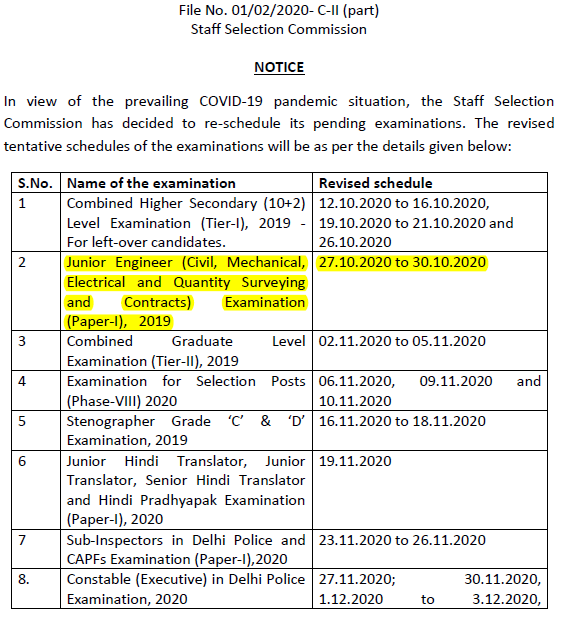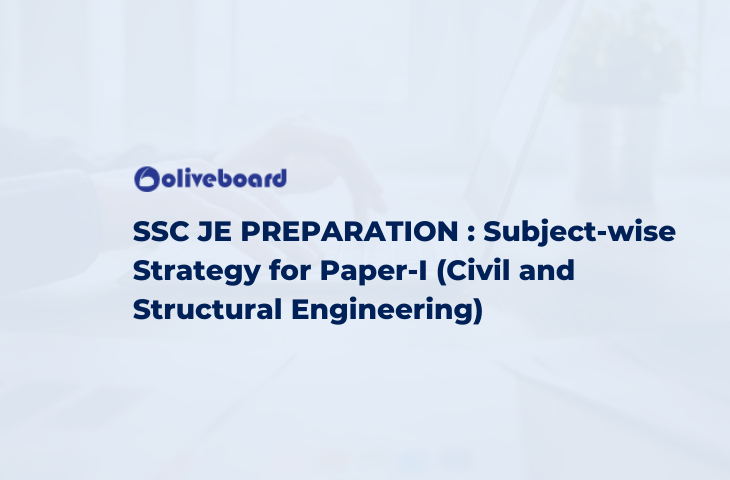In our last article we discussed about SSC JE (civil engineering) examination in detail. We did a very thorough analysis of previous year question paper which is very crucial for SSC JE preparation. In that analysis we found about the pattern of questions asked in exam and also analyzed its difficulty level. In continuation of the article we will now look more into SSC JE preparation Paper-l, Part-A (Civil Engineering) in particular.
SSC JE preparation: Paper -l
Paper-l consists of three parts: Reasoning, General Awareness and Part-A (civil and structural engineering).
SSC JE preparation: Part-A Civil & Structural Engineering subjects
- Hydraulics
- Building Materials
- Soil Mechanics
- Irrigation Engineering
- Estimating, Costing and Valuation
- Environmental Engineering
- Theory of Structures
- Surveying
- Concrete Technology
- RCC Design
- Transportation Engineering
- Steel Design
SSC JE preparation: Part-A (civil and structural engineering) subject wise strategy
Every subject require a different approach for its preparation. The demand of SSC JE examination from a candidate in Paper-I (Part-A) is that every subject should be read thoroughly covering the width of the concepts rather than depth of the concepts (which is required for SSC JE Mains exam preparation). Therefore let’s look into how we can prepare civil engineering subjects in context of SSC JE preparation Paper-I (Part-A). We will now discuss strategy for each civil engineering subject in SSC JE examination syllabus.
- Hydraulics
Memorize formulae, standard values and basic definitions. Practice formula based numerical questions. Prepare ‘fluid mechanics’ section thoroughly and for numerical questions in particular. Memorize units of various parameters. Remember basic terminologies and definitions.
- Building Materials
This subject is mostly theoretical and a very few numerical questions are asked from this subject which are of moderate to tough difficulty level. Very minute factual details and name of IS codes should be memorized to score good marks in this subject.
- Soil Mechanics
Memorize formulae and basic definitions. Read various soil mechanics tests in detail. Index properties and interrelationship of different parameters is very important section and few questions are asked every year from this section.
- Irrigation Engineering
Remember factual details. Overall a tough section due to volume of facts that need to be memorized and constantly practiced. Regular practice and repeated revision is the key to score good marks in this section. Some formula based numerical questions are also asked so also practice numerical questions but need not to spend much time on it and prepare other sections which are scoring.
- Estimating, Costing and Valuation
Remember definitions and facts. Practice numerical questions. Practice estimation methods thoroughly.
- Environmental Engineering
Remember standard values of water quality parameters. Understand various treatment processes and design of sewers thoroughly in particular. At last remember standard definitions/factual details.
- Theory of Structures
Overall a very conceptual subject so remembering formulas can help to a certain extent but it is risky if one does not know the conceptual application. Therefore understanding the concepts is the only option. Basic definitions should be memorized.
- Surveying
Mostly theoretical section needs to be covered. Memorize small factual details and formulae Prepare various methods of surveying and various surveying instruments in particular.
- Concrete Technology
Concrete mix design and properties of concrete should be prepared thoroughly in particular apart from memorizing factual details of other theoretical sections. Practice numerical questions on concrete mix design. This subject should be prepared after the preparation of most scoring subjects since number of questions asked from this section are few.
- RCC Design
Majority of questions are based on IS 456: 2000. A very thorough reading of IS code should be done. Recommended design specifications from relevant sections in code should be memorized. Overall a very conceptual subject and understanding of design concepts is must.
- Transportation Engineering
Remember formulae, basic definitions and factual details.
- Steel Design
Thorough reading of IS 800:2007 code is must. Remember basic terminologies, facts and design concepts. This subject should be prepared after the preparation of most scoring subjects since number of questions asked from this section are few.
Few Important Preparation Tips
-
Revision
Since most subjects require memorizing of basic definitions/terminologies/formulae/factual details, constant revision should be done by candidate to remember these. There is little point in preparing if periodic revision is not done. Many times a candidate is not able to solve question in spite of having good understanding of subject, due to lack of revision. So constant revision is must.
-
Preparing most scoring subjects first
Subjects which have more weightage in question paper, need to be prepared first. If these subjects are prepared thoroughly candidate can score very good marks in Paper-I.
-
Practice as many mock tests as possible
To know the status of preparation mock tests should be solved regularly. Candidate will make many mistakes during mock tests which cannot be repeated in actual exam. Learn from those mistakes and improve in the next test. In the process of solving mock tests regularly candidate will memorize all the formulae eventually.
-
Improving test score
Candidate should try to improve his/her score constantly. Revision and analysis of mock test paper is crucial. Every mock test should be analyzed after exam.
-
Manage time in exam
Mock test help in managing time smartly in actual exam. Every mock test should be taken seriously and attempted in exam like atmosphere.
If all the points mentioned above are followed, candidate can score very good marks in Paper-I and increase his/her chances of selection significantly.
Study plan to prepare for SSC JE (civil and structural) in 50 days!!!!
Revised dates
As per the notice released by Staff Selection Commission on July 21, 2020, the revised dates of SSC JE (Civil and Structural) Examination 2019, Paper-1 are as follows:

As revised examination dates of examination leaves only 50 days for SSC JE preparation, let’s see how can we cover the syllabus more efficiently in this limited amount of time.
Paper-I
General Intelligence & Reasoning
In this section questions will be of the following types
- Verbal
- Non-verbal
Questions will also be asked from the following topics:
Arithmetical reasoning, analogies, relationship concepts, observation, space visualization, judgment, decision making, discrimination, problem solving, analysis, visual memory, verbal and figure classification, arithmetical number series, similarities, differences, etc.
In this section only consistent practice through mock test can increase the score in exam. Practice through mock tests will improve the speed and eventually lead to a good attempt in this section.
General Awareness
Questions will be broadly asked from the following topics
- Current affairs relating to India and its neighbouring countries
- History (ancient, medieval and modern history)
- Indian culture
- Geography
- Economics
- Indian constitutions
- Science and technology
- Awards/honours/sports etc.
The questions from the above topics will be fact based. Static general knowledge part (history, geography, economics, Indian Constitution) is very vast in scope and all of it can not be covered in short span of time. It would be more useful to just keep revising whatever the candidate had studied till now and practicing mock tests regularly. But the current affairs part can be scoring. A good reading of events/facts/awards/honours etc. in news for the past 6-8 months should be sufficient. Again cover this section through practicing mock questions. Concise current affairs from a good source can prove beneficial for the preparation of this section.
General Engineering: Civil & Structural (Part-A)
A very comprehensive analysis of SSC JE (civil and structural) previous year question paper was presented in our last blog and in this blog a subject-wise strategy has been explored. Candidates can refer to this subject-wise strategy to understand how to study each subject for SSC JE preparation.
Few tips to maximize score in last 50 days before SSC JE exam
- Solve as many previous year question papers as possible. Very often same questions are asked in different manner or repeated. Many questions are based on same formulae/fact/design specification etc. as asked in SSC JE previous year exams.
- Read codes (IS 456:2000 and IS 800:2007) atleast three times and revise design specifications/standard values etc. on daily basis.
- Make short notes of the concepts/formula/facts/definitions etc. that you study. These are very important for last minute revisions.
- Preparations should be fully oriented for MCQ type questions. Many a times elimination of the options leads to the correct answer of the question. While solving mock test questions each option of the question should be studied thoroughly.
- Spend ideally 3-4 hours on solution of each mock test you solve and make notes of the concepts/formulae/facts etc. asked in the question. Revise the notes many times. Find out the mistakes made while solving mock tests and improve upon it continously.
- Do not read fresh concepts few days before the exam. Focus should be solely on revision.
- Subjects having more weightage in SSC JE 2018 exam– Hydraulics, Building Materials, Soil Mechanics, Irrigation Engineering, Estimating, Costing and Valuation, , RCC Design, Surveying, Transportation Engineering.
These subjects have an overall good weightage in SSC JE previous year exams. So these can be prioritized if there is paucity of time for preparation.
Other subjects (Theory of Structures, Concrete Technology, Steel Design, Environmental Engineering) can be studied thorougly if time permits.
- Since there is negative marking in the exam, decide your good attempt of questions through giving mock tests. When you solve enough mock tests you will come to know how many questions can be attempted with minimum risk of negative marking.
- At last revise, revise, revise!!!!!
For more details about SSC JE Examination and notification click here.
To practice mock test for reasoning and general awareness click here
For current affairs click here
For our previous article click here
To practice, register here for a free mock test
That is all from us for this blog. We will be back soon with another aspect of SSC JE preparation to discuss. In the meantime keep preparing. All the best.

Hello there! I’m a dedicated Government Job aspirant turned passionate writer & content marketer. My blogs are a one-stop destination for accurate and comprehensive information on exams like Regulatory Bodies, Banking, SSC, State PSCs, and more. I’m on a mission to provide you with all the details you need, conveniently in one place. When I’m not writing and marketing, you’ll find me happily experimenting in the kitchen, cooking up delightful treats. Join me on this journey of knowledge and flavors!
